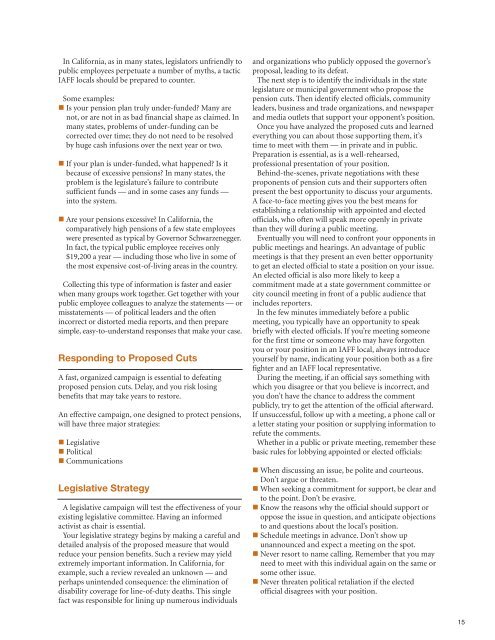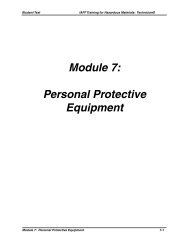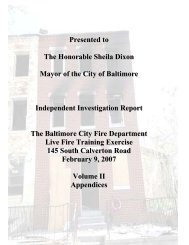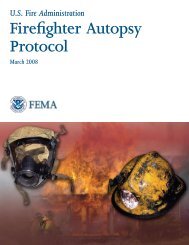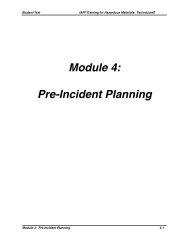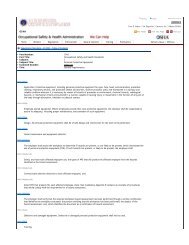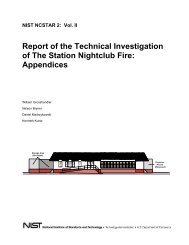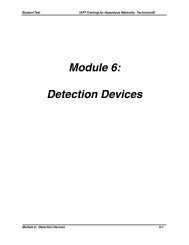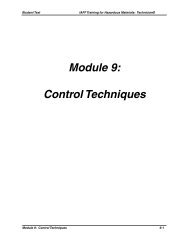Pension Handbook - International Association of Fire Fighters
Pension Handbook - International Association of Fire Fighters
Pension Handbook - International Association of Fire Fighters
Create successful ePaper yourself
Turn your PDF publications into a flip-book with our unique Google optimized e-Paper software.
In California, as in many states, legislators unfriendly to<br />
public employees perpetuate a number <strong>of</strong> myths, a tactic<br />
IAFF locals should be prepared to counter.<br />
Some examples:<br />
Is your pension plan truly under-funded? Many are<br />
not, or are not in as bad financial shape as claimed. In<br />
many states, problems <strong>of</strong> under-funding can be<br />
corrected over time; they do not need to be resolved<br />
by huge cash infusions over the next year or two.<br />
If your plan is under-funded, what happened? Is it<br />
because <strong>of</strong> excessive pensions? In many states, the<br />
problem is the legislature’s failure to contribute<br />
sufficient funds — and in some cases any funds —<br />
into the system.<br />
Are your pensions excessive? In California, the<br />
comparatively high pensions <strong>of</strong> a few state employees<br />
were presented as typical by Governor Schwarzenegger.<br />
In fact, the typical public employee receives only<br />
$19,200 a year — including those who live in some <strong>of</strong><br />
the most expensive cost-<strong>of</strong>-living areas in the country.<br />
Collecting this type <strong>of</strong> information is faster and easier<br />
when many groups work together. Get together with your<br />
public employee colleagues to analyze the statements — or<br />
misstatements — <strong>of</strong> political leaders and the <strong>of</strong>ten<br />
incorrect or distorted media reports, and then prepare<br />
simple, easy-to-understand responses that make your case.<br />
Responding to Proposed Cuts<br />
A fast, organized campaign is essential to defeating<br />
proposed pension cuts. Delay, and you risk losing<br />
benefits that may take years to restore.<br />
An effective campaign, one designed to protect pensions,<br />
will have three major strategies:<br />
Legislative<br />
Political<br />
Communications<br />
Legislative Strategy<br />
A legislative campaign will test the effectiveness <strong>of</strong> your<br />
existing legislative committee. Having an informed<br />
activist as chair is essential.<br />
Your legislative strategy begins by making a careful and<br />
detailed analysis <strong>of</strong> the proposed measure that would<br />
reduce your pension benefits. Such a review may yield<br />
extremely important information. In California, for<br />
example, such a review revealed an unknown — and<br />
perhaps unintended consequence: the elimination <strong>of</strong><br />
disability coverage for line-<strong>of</strong>-duty deaths. This single<br />
fact was responsible for lining up numerous individuals<br />
and organizations who publicly opposed the governor’s<br />
proposal, leading to its defeat.<br />
The next step is to identify the individuals in the state<br />
legislature or municipal government who propose the<br />
pension cuts. Then identify elected <strong>of</strong>ficials, community<br />
leaders, business and trade organizations, and newspaper<br />
and media outlets that support your opponent’s position.<br />
Once you have analyzed the proposed cuts and learned<br />
everything you can about those supporting them, it’s<br />
time to meet with them — in private and in public.<br />
Preparation is essential, as is a well-rehearsed,<br />
pr<strong>of</strong>essional presentation <strong>of</strong> your position.<br />
Behind-the-scenes, private negotiations with these<br />
proponents <strong>of</strong> pension cuts and their supporters <strong>of</strong>ten<br />
present the best opportunity to discuss your arguments.<br />
A face-to-face meeting gives you the best means for<br />
establishing a relationship with appointed and elected<br />
<strong>of</strong>ficials, who <strong>of</strong>ten will speak more openly in private<br />
than they will during a public meeting.<br />
Eventually you will need to confront your opponents in<br />
public meetings and hearings. An advantage <strong>of</strong> public<br />
meetings is that they present an even better opportunity<br />
to get an elected <strong>of</strong>ficial to state a position on your issue.<br />
An elected <strong>of</strong>ficial is also more likely to keep a<br />
commitment made at a state government committee or<br />
city council meeting in front <strong>of</strong> a public audience that<br />
includes reporters.<br />
In the few minutes immediately before a public<br />
meeting, you typically have an opportunity to speak<br />
briefly with elected <strong>of</strong>ficials. If you’re meeting someone<br />
for the first time or someone who may have forgotten<br />
you or your position in an IAFF local, always introduce<br />
yourself by name, indicating your position both as a fire<br />
fighter and an IAFF local representative.<br />
During the meeting, if an <strong>of</strong>ficial says something with<br />
which you disagree or that you believe is incorrect, and<br />
you don’t have the chance to address the comment<br />
publicly, try to get the attention <strong>of</strong> the <strong>of</strong>ficial afterward.<br />
If unsuccessful, follow up with a meeting, a phone call or<br />
a letter stating your position or supplying information to<br />
refute the comments.<br />
Whether in a public or private meeting, remember these<br />
basic rules for lobbying appointed or elected <strong>of</strong>ficials:<br />
When discussing an issue, be polite and courteous.<br />
Don’t argue or threaten.<br />
When seeking a commitment for support, be clear and<br />
to the point. Don’t be evasive.<br />
Know the reasons why the <strong>of</strong>ficial should support or<br />
oppose the issue in question, and anticipate objections<br />
to and questions about the local’s position.<br />
Schedule meetings in advance. Don’t show up<br />
unannounced and expect a meeting on the spot.<br />
Never resort to name calling. Remember that you may<br />
need to meet with this individual again on the same or<br />
some other issue.<br />
Never threaten political retaliation if the elected<br />
<strong>of</strong>ficial disagrees with your position.<br />
15


